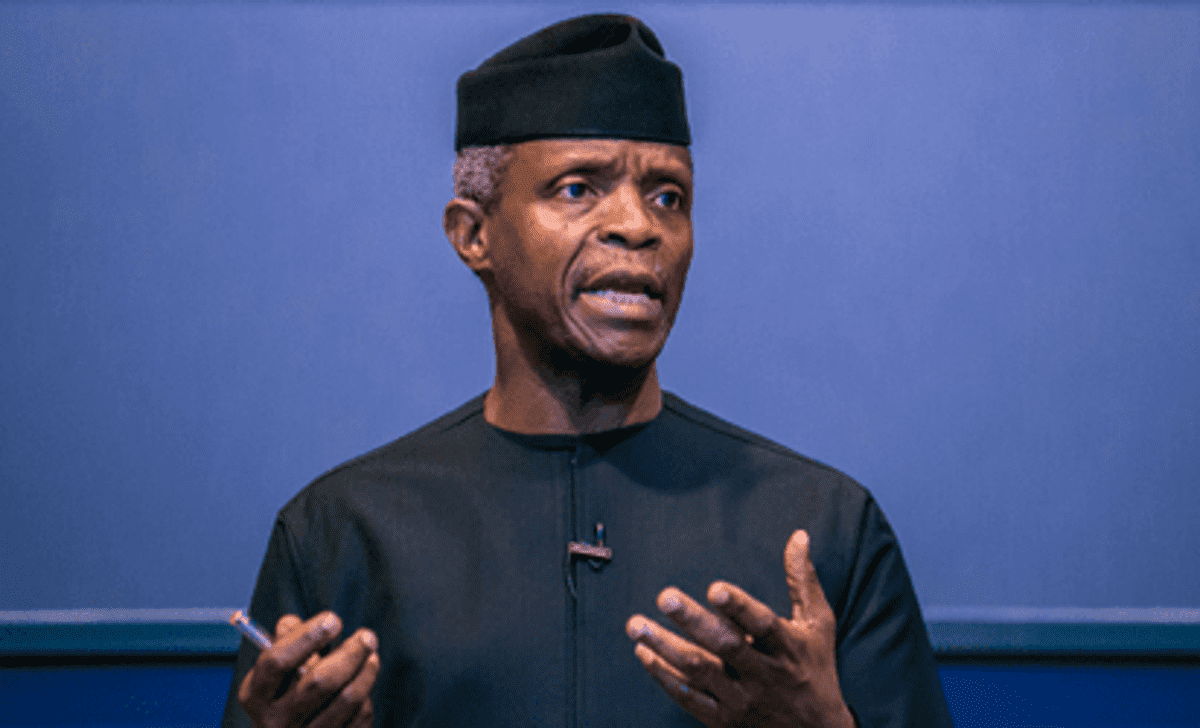Vice President Yemi Osinbajo says the principle of fairness must be applied by leaders in addressing challenges in health, the economy, and other issues.
Osinbajo’s spokesman, Laolu Akande, in a statement on Wednesday in Abuja, said that the vice president spoke at a virtual forum organised by a leading American Christian University, Liberty University.
The forum with the theme “Equity for Africa: Transforming the World through Judeo-Christian Values,” was hosted by the university’s School of Business.
Osinbajo said that fairness was needed in building a fairer world that took into account the interest of the poor, the marginalised and a world that did not impose unfair burdens on developing countries.
He warned that current trends in global vaccine distribution headed towards vaccine nationalism.
“The principle of fairness obliges us, as people of faith, to strive to build a fairer world, a world which takes account of the interests of the poor and marginalised.
Read Also: Petroleum minister moves to avert looming strike threatening Chevron’s 140,000 bpd output
“It means a world that does not impose unfair burdens on developing countries when global cooperation is required.
“For example, if you look at what is happening with COVID-19 and access to vaccines, what we are seeing is export bans and a resort to vaccine nationalism.
“Christian leaders must lead the world towards ensuring that all countries and their peoples can access vaccines irrespective of the resources available to them.
“The same considerations apply to helping African countries cope with the economic crisis caused by COVID-19.”
He restated his earlier call on some multilateral agencies planning to de-fund gas projects to review their position.
Osinbajo said that it was worrisome and should be dropped, adding that people of conscience and faith should put a stop to the trend that could undermine the sense of collective responsibility towards mitigating climate change.
“One issue that is emerging as a major concern in terms of equity and fairness is the process of reaching a just transition towards a low-carbon economy.
“Africa including Nigeria has abundant gas resources and gas is cleaner by far than crude oil and it derivatives.
“Gas has an important contribution to make in our economies in terms of transportation and even in terms of cooking to replace coal and kerosene.”
The vice president also spoke about the prospects for greater advancement in Africa.
According to him, there is no gainsaying that in order for Africa to actualise its potential, it must work with friends especially those of faith to identify strategic opportunities to bring about growth and prosperity in the continent.
“Investing in Nigeria also offers a pathway to partaking in the African Continental Free Trade Area (AfCFTA) which will create a market in goods and services for up to 1.3 billion people.
“It is also a pathway to using the provisions of the African Growth and Opportunity Act to produce goods that can then be exported into the U.S. under preferential terms.
“The opportunities are vast and it is not surprising that Nigerian business leaders who know the country well and appreciate its economic dynamics are making big investments in oil and gas, in agriculture and food processing, in telecommunications, in power generation, in technology and in the hospitality and creative sectors.”
Citing example of some investments, Osinbajo said that the Dangote Group was building a 650,000 barrel a day refinery while the BUA Group had also initiated an investment in 200,000 barrel a day refinery.
He said that in the same vein, Azura, Transcorp and several other power companies had made large and significant investments.
“In the digital technology space, Paystack, a Nigerian fintech Start-up was recently acquired by Stripe, the U.S.-based firm for 200 million dollars while similarly impactful investment has also been made by large global technology firms.
“Microsoft has set up its African Development Centre in Lagos, Facebook has located its Africa Hub in Lagos where the Google Developer Space is also located.”
He commended the U.S. Government for its stand on the IMF Special Drawing Rights.
According to him, the increase in Special Drawing Rights at the IMF will give more liquidity to developing countries.
He expressed optimism that the IMF Board would move speedily in that regard.
The Special drawing rights (SDRs) are supplementary foreign exchange reserve assets defined and maintained by the International Monetary Fund (IMF).
They represent a claim to currency held by IMF member countries for which they may be exchanged.
Participants at the forum included Governors Samuel Ortom of Benue, and Seyi Makinde of Oyo State, David Brat, Dean of the Liberty University School of Business, business leaders across the U.S., among others.(NAN)



Leave a Reply